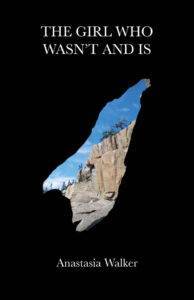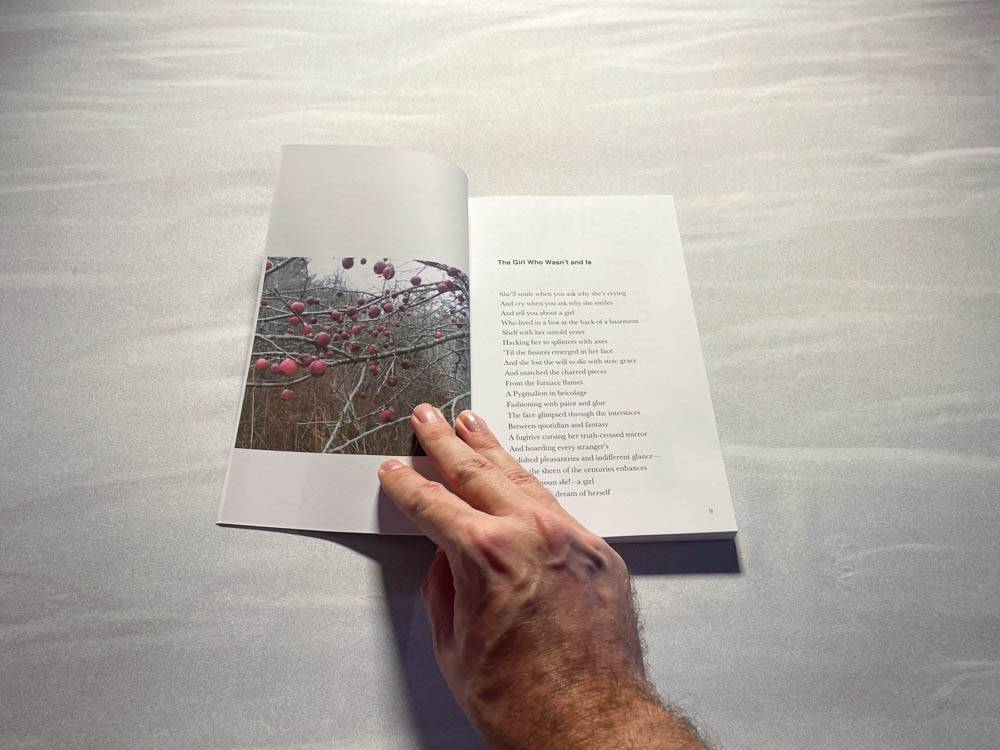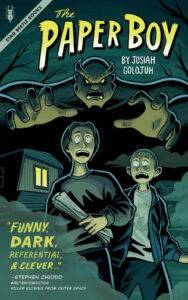From the Publisher: “The Girl Who Wasn’t and Is, Anastasia Walker’s first book of poetry, is a deeply personal work and a meditation on community, history, and the natural world. In a series of poems and a closing autobiographical essay, the poet embraces her identity as a transgender woman through a harrowing, wonder-full journey from her childhood on the Maine coast to her post-transition life in Pittsburgh, Pennsylvania. Original photos and drawings, and the interspersed stories of family and friends, community members, historical and mythological figures, and the allied struggles of others create a broad sense of connection. The Girl Who Wasn’t and Is is a rich mosaic that invites readers to a conversation about death and life, despair and hope, time and memory, and the perennial complexities of love…”
More Info The following is a conversation between Anastasia Walker and the poet Reymond Drew, provided courtesy of the very cool publisher bd-studios.com.
Press Release
Interview by Reymond Drew
 Recently I spent a chilly day in bed, reading The Girl Who Wasn’t and Is, the debut collection by local poet Anastasia Walker. Anastasia’s book feels like a no-looking-back plunge down a rabbit hole, and while in slow free-fall, you spend some time examining the more visceral sides of humanity. The collection plays with poetic style and hops around various points in time, from Stonewall Riot days to modern-day hashtag movements, to romantic echoes of Whitmanesque eras gone by. The Girl Who Wasn’t and Is serves as a mournful eulogy at times, both for lost parts of self and the loss of others. It reads like a poignant manifesto of all the sacred beauty, disappointment, and danger that comes with being alive.
Recently I spent a chilly day in bed, reading The Girl Who Wasn’t and Is, the debut collection by local poet Anastasia Walker. Anastasia’s book feels like a no-looking-back plunge down a rabbit hole, and while in slow free-fall, you spend some time examining the more visceral sides of humanity. The collection plays with poetic style and hops around various points in time, from Stonewall Riot days to modern-day hashtag movements, to romantic echoes of Whitmanesque eras gone by. The Girl Who Wasn’t and Is serves as a mournful eulogy at times, both for lost parts of self and the loss of others. It reads like a poignant manifesto of all the sacred beauty, disappointment, and danger that comes with being alive.
Anastasia is a fellow transgender poet. While she is very well-traveled n’at, by happenstance more than anything else, she eventually landed in the ‘Burgh about ten years ago and has called the city home ever since.
RD: The book feels like an experience through the depths of your humanity, both within your lived individual experience and your life as a trans person. What are your thoughts on the kind of experience cisgender readers will have with the work?
AW: You know, it’s interesting. When I was writing the book, I thought of my primary audience as cis readers. Being older and having come out later in life and just mixed in cis circles all my life, I have been mapping where I am in relation to cis heteronormativity. So, I thought of what I was writing as ‘here’s what it’s like to be me, to be us.’
I read a recent poll, 80% of cis people have claimed to have never known one of us. That’s a big number, right? Given the situation that we’re in as a community right now, even in the current democratic administration, we still have all this transphobic legislature being thrown at us in the different states. I just think of the importance of visibility. Here’s what we are, here’s what we’re like.
RD: Do you have a poem in the book that most highlights your experience as a trans person?
AW: One of my favorite poems of the book is Hope’s the Drug You, and it’s just basically writing to my family members, my parents in particular. There’s a line in there about, ‘this nostalgia y’all have for a world where I was impossible.’
I like the word ‘impossible’ because I think it will puzzle cis readers. What does it mean to be impossible in a particular world? These are things you [cis readers]don’t even think about, and that’s privilege, right?
RD: You speak candidly about mental health, depression, and suicide. So you feel your writing is connected to the greater experience of mental health, such as collective mental health, reducing stigma, and the mental health crisis of LGBTQ people.
AW: My modeling is just being honest. This is what happens, this is what it felt like, this is what it still feels like. I grew up in eastern Maine. My stock, so-to-speak, was tight-lipped Yankees. We did not talk about stuff like that [mental health]. I just clammed up and kept it all inside, and it took decades to undo that. The sense of stigma surrounding mental health generally, and then obviously what I was going through specifically. A phrase I used in an essay I published last year was “acknowledging my own brokenness,” and that was hard, that was really hard.
RD: Activism plays a key role in this entire work, both by the bravery of candidly publishing details about your life and addressing racism and the erasure of trans femmes, especially our BIPOC sisters. Can you say more about how your role as an activist is intertwined with your life as a poet and artist?
AW: That old feminist adage, ‘the personal is political’ is very true for us, given that we live in this highly politicized space.
Thinking back to my younger years, I have realized in some ways I was colonized by cis and heteronormative views of what we should be. I have discovered that I am being colonized psychologically within a dominant [cisgender]system in which I am impossible, in which I am erased.
I can’t speak about what it is like to be BIPOC, but as [white]trans folks, we have shared experience. So many of us have traumas, and that is where we can meet.
RD: Lily Law n the Street Queens is a departure in style from the rest of the book. There is a real “street beat” feel to it. Can you tell me more about how that poem came to be?
AW: I read a history of the Stonewall riots, and this was a scene that leaped out at me. This description of these young kids, they were homeless and were either trans or gender non-conforming before that term was as clearly defined as it is today. During the riot, they confronted these New York City policemen. The policemen advanced on them with billy clubs and guns, and these young kids just basically do this chorus line! That image possessed me. Holy shit! They dared to do this! I thought, ‘All right, I have to do something with this.’ That’s where the poem came from, being possessed by that historical episode and wanting to get into the desperation and anger. That feeling of ‘I’ve had it! I’ve had enough of this shit, and I am not going to do this anymore!’
RD: Is there anything beyond the book that you care to share?
AW: There isn’t a whole lot of humor in this book, but I swear, I can be funny. Please visit my blog if you doubt that I have a sense of humor!
RD: Maybe your next book!
AW: Yes, maybe I could do some nonsense verse! That would be kind of fun.
RD: Hey, you know, in 2022, literally anything is possible. That’s my motto.
AW: Absolutely.
Reymond Drew is an lg[bt]q poet, edm dj, mystic, and his current occupation of choice is Zamboni driver. He was born and raised in Wyano, the weirdest Westmoreland County town you’ve never heard of. He has a forthcoming collection of poems titled 20 Attempts at Grieving about losing his sweet mama to leukemia in May 2021. You can find more about him at https://rotf.lol/reymondd
Anastasia Walker is a poet, essayist, and scholar originally from Maine but now calls the Pittsburgh area home. She volunteers for the Transgender Law Center’s Prison Mail program and is a proud member of her community’s Indivisible group. She’s a passionate amateur photographer and musicologist and loves going for long walks and swimming in the ocean. Visit her online at https://anastasiaswalker.blogspot.com/
The Girl Who Wasn’t and Is will be available from bd-studios.com or your favorite bookstore on 4 February 2022.


























